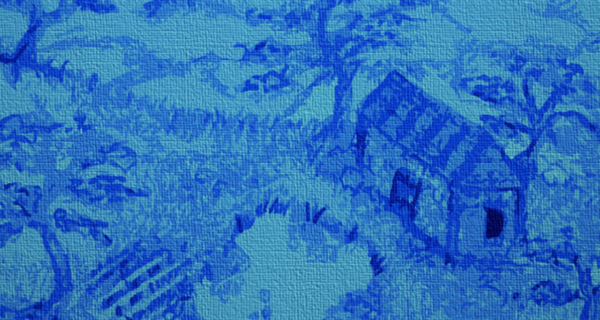Stonehouse (Shihwu) was born in 1272 in the town of Changshu, in Yushan not far from the mouth of the Yangtze River. The beautiful landscape of Yushan inspired much of Shihwu’s work. His poetry was drawn from by his honest, simple life spent living with and observing the natural world around him, and reflecting on his place within it.
He was born into a family of moderate to high means, and so was able to receive a traditional Confucian education. However, when he was a young adult he changed paths, quit his studies, and joined the Hsingchiao Chungfu Temple as a novice monk under the tutelage of Master Yung-wei. Three years later he was formally ordained and given the monastic name Ch’ing-kung (also the name of a qigong/martial arts technique for making the physical body extremely light in weight by altering the flow of Qi).
Records don’t tell us when it was that he adopted the name Shihwu (Stonehouse), but what we do know is that there was a large cavern in the area where he lived of the same name. The cavern was so huge that it was said a whole house could fit inside of it. It had a permanent natural spring flowing from its mouth all year long, and was surrounded by beautiful pine forests. It was common practice, at this time, for educated people to take several different names throughout their lives, denoting the different phases which they progressed through. Buddha, himself, had several names in his lifetime before reaching enlightenment and becoming Buddha; some of the better known were Siddhartha Gautama, Shakyamuni, and Tathagata. Each subsequent name was taken as Buddha transitioned from one stage of his journey to another. It is likely that Shihwu adopted the name Stonehouse at some point during his studies.
Following his ordination, Shihwu had many travels and adventures, but at the age of forty he decided that he preferred life in the mountains. He turned down a very prestigious post as meditation master of Lingyin Temple (100km to the south) and moved back to Huchou. He built a hut on the southern summit of Hsiamushan mountain and retired from the world to begin life as a hermit.
It was a customary practice for monks to beg for food from the local villages and towns, but Shihwu despised begging and chose, instead, a life of hard work and meagre means. He existed on stream and spring water and had a diet of wild plants. He didn’t have much, but was known to be a very generous man who always gave his hospitality to strangers, and shared what little he had with those who turned up at his door.
Reading this book of his collected poetry, it is impossible not to feel a strong connection to this deep thinking and unique man. His poetry is a doorway to his day to day life, in all of its beautiful, honest simplicity. While I’m not sure that I have the fortitude or good health to live such a harsh life, high up in the mountains, this is the life that I yearn for in every fibre of my being. To be that separated from the toxic touch of modern living, of a society which seems to rejoice in the misery of others and focus only on material gain and becoming ever richer; what better existence could there be? This man was handed position and respect, and he turned it all down in pursuit of a truly enlightened existence, in a place too beautiful to be believed.
I would highly recommend reading Shihwu’s poetry. It is a singularly illuminating experience, most especially at a time where we all face many forms of enforced isolation. Let Stonehouse’s experiences raise you up and give you a different, Zen perspective on what we humans actually ‘need,’ versus all of the meaningless rubbish which society and big business constantly force upon us.
An Excerpt from ‘The Mountain Poems of Stonehouse’ ~ assembled and transcribed by Red Pine:
“I made my home west of Cha River
where water fills Sky Lake and the moon fills the stream
strangers are frightened by the mountain’s heights
but once they arrive they know the trail
dried snail shells on rock walls, fresh tiger tracks in the mud
I leave my door open when Spring days get longer
when paulownias bloom and thrushes call.”
Image: Original Artwork by Beth Amos
Note by Red Pine: Both the east and the west forks of the Tiao River originate in the Tienmu Mountains west of Hangchou, meet in Huchou, then flow into nearby Lake Taihu. The last stretch of their combined waters, from Huchou to Taihu, is called the Cha River. As early as the Sung dynasty, the city of Huchou was also referred to by this name. Hence, when Stonehouse says he lived west of Cha River, he means west of Huchou. Actually, the mountain on which he lived was twenty-five kilometers to the southwest. Sky Lake was the name he gave to the small pond in front of his hut. Nowadays, it is also called Butterfly Spring, because of the shape of its two “wings,” or Medicine Spring, because of the reputed healing quality of its water. Until recently, hermits in China often reported encounters with the South China tiger, which is much smaller than its Siberian and Bengali cousins but still dangerous. The paulownia is one of China’s most fragrant trees. It blooms in late March and early April and is the only tree on which the phoenix will alight—should a phoenix be flying by. In the last line, I’ve read hua-hu, a compound not attested in any dictionary or database, as a copyist error or local usage for hua-mei: “thrush.””
If you are interested in buying this book you can find it over on Amazon via the following link…

